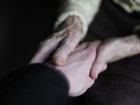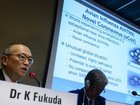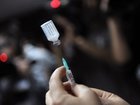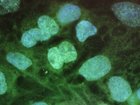Women who smoke and drink heavily are at a higher risk of early death than men who do the same, a study said Tuesday.
Data taken from a Europe-wide survey of some 380,000 people aged 40 and older, revealed that women faced a disproportional risk from the already well-known ill effects of heavy alcohol and tobacco use.
 Full Story
Full Story
A Chinese province is likely to abolish mandatory HIV tests for teachers, the first region on the mainland to do so, state media said Tuesday.
HIV carriers are excluded from civil service jobs including teaching and policing in many provinces across China, leading to accusations of discrimination from rights groups.
 Full Story
Full Story
An 81-year-old woman who had contracted a SARS-like coronavirus has died in Saudi Arabia, raising the death toll in the kingdom to 18, the health ministry said in a statement on Sunday.
"An 81-year-old woman who was suffering from kidney failure as well as other chronic illnesses has died" in the eastern Al-Ahsaa region of oil-rich Saudi Arabia after contracting the virus, it said.
 Full Story
Full Story
South Korea's obsession with plastic surgery is moving on from standard eye and nose jobs to embrace a radical surgical procedure that requires months of often painful recovery.
A stream of celebrities boast on TV shows how it gave them a "new life," while advertisements extolling its cosmetic benefits are everywhere from street billboards to subway stations, magazines and popular Internet sites.
 Full Story
Full Story
Research in teens adds fresh evidence that the 1980s "crack baby" scare was overblown, finding little proof of any major long-term ill effects in children whose mothers used cocaine during pregnancy.
Some studies have linked pregnant women's cocaine use with children's behavior difficulties, attention problems, anxiety and worse school performance. But the effects were mostly small and may have resulted from other factors including family problems or violence, parents' continued drug use and poverty, the researchers said.
 Full Story
Full Story
Four separate teams of scientists have said they were unable to replicate a highly publicized study that last year touted a cancer drug's success against Alzheimer's disease in mice.
"We wanted to repeat the study to see if we could build on it, and we couldn't," said David Borchelt, a professor of neuroscience at the University of Florida, noting that "it was important to publish the fact."
 Full Story
Full Story
The World Health Organization voiced deep concern Thursday over the SARS-like virus that has killed 22 people in less than a year, saying it might potentially spread more widely between humans.
"We have a high level of concern over the potential... for this virus to have sustainable person-to-person spread," WHO deputy chief Keiji Fukuda told diplomats gathered in Geneva for the World Health Assembly, the U.N. agency's decision-making body.
 Full Story
Full Story
Finnish researchers unveiled new data Thursday to link the Pandemrix flu vaccine to a higher risk of the sleeping disorder narcolepsy in adults
Finnish researchers unveiled new data Thursday to link the Pandemrix flu vaccine to a higher risk of the sleeping disorder narcolepsy in adults.
 Full Story
Full Story
The H7N9 strain of bird flu can spread among ferrets and could do the same among humans under certain conditions, according to lab animal studies on the virus published Thursday.
So far there have been no known cases of human-to-human spread of the new virus, which has infected 131 people and killed 36 since it first emerged in China in March.
 Full Story
Full Story
A blockbuster study in which U.S. researchers reported that they had turned human skin cells into embryonic stem cells contained errors, its lead author has acknowledged.
Shoukhrat Mitalipov nevertheless adamantly stood by the conclusions of the study published last week in journal Cell, which reported that human stem cell lines for the first time had been created via cloning.
 Full Story
Full Story



